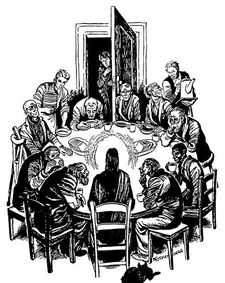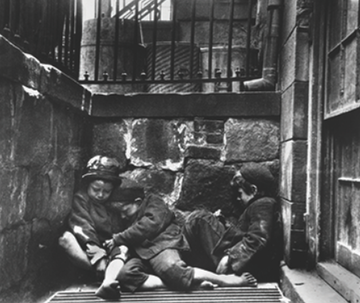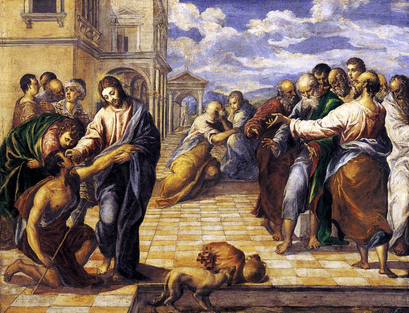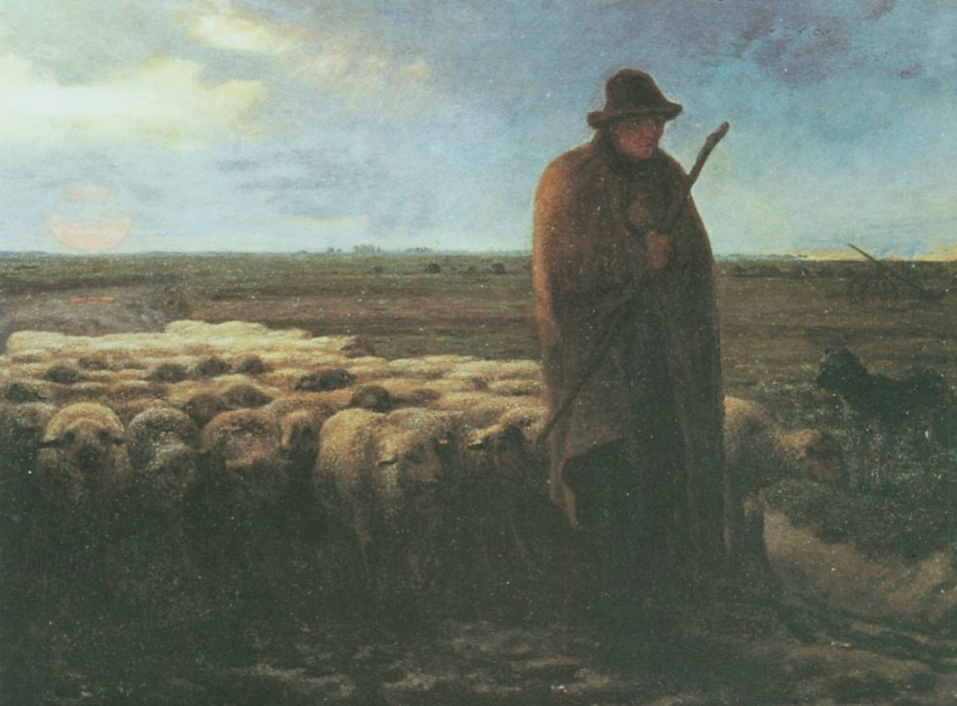 Sermon prep for and thoughts from my study of the last half of Luke's Sermon on the Plain (Luke 6) . . . Church, imagine a trafficked woman and one who used to enslave women sitting at that Table, after breaking bread, having a supper, and after lifting that fourth cup together to celebrate Jesus as Savior and King . . . imagine a beggar and a wealthy man . . . imagine a wife and her husband, who'd normally have been found with a temple prostitute or at a similar supper using women as entertainment . . . imagine young boys and men who had, until recently, frequented similar suppers where such young boys were entertainment . . . imagine . . . imagine the early church gathered at that Table now ready to listen to someone read the parchments containing Luke's Gospel . . . imagine . . . Imagine hearing the Sermon on the Plain being read (Luke 6:20-49) . . . imagine they all hear, not only the blessings on the poor and the cursing on the rich (vv. 20-26), but hear “love your enemies,” “do good to those who hate you,” “pray for those who abuse you” (vv. 27--29). . . “do not judge” . . . “do not condemn” . . . “forgive to be forgiven” (v. 37) . . . and “give and lend without regard to getting anything in return” nor “demand back what was taken” (vv. 35, 38) . . . imagine those who were around those first Tables, not only hearing these words, but doing them . . . Sometimes I think we have it way too easy at this church stuff and that has dulled our hearing . . . and flattened our doing . . . and it is no wonder our houses crash when those winds come . . . it is not enough to be hearing His word and, frankly, it is not enough just to do the word where it is easy and socially and culturally safe. Other Luke 6 Sermon on the Plain thoughts . . .
0 Comments
 Sometimes chapter divisions can detour from hearing what the author of a biblical text has said. This is so true of 1 Corinthians 13. Most, at least from all the sermons I have heard and the weddings I have attended attest. Nonetheless, chapter 12 and chapter 13 of 1 Corinthians are in need of being heard together as if there is no chapter division between them. In fact, there is a bookend link between 12:13 and 13:13: ζηλοῦτε δὲ τὰ χαρίσματα τὰ μείζονα (12:31a) μείζων δὲ τούτων ἡ ἀγάπη (13:13b) Even those who don’t know New Testament Greek can see it––you can see the word “greater” (μείζονα, 12:31a / μείζων, 13:13b) at the close of chapter 12 and the close of chapter 13. Different endings (like Spanish), of course, but the same word: μέγας (great/greater) in 12:31a and 13:13b. The NASB, as do other translations, offers what I think is a much better read than the ESV: “But earnestly desire the greater gifts” (12:31a, NASB) Don’t know why the ESV translates the word μέγας as “higher.” I suppose it could, but this doesn’t help the English reader. The mistranslation masks the bookends here, which, in turn, masks the dynamic relationship between 1 Corinthians 12 and 13–these two chapters need to be read as one. So you can see (and hear) what Paul has crafted (with my more word for word translation):
So what does this do for us as we read chapters 12 and 13 together? First, we take and read the two as one thread and not separate chapter 13 as if it is a stand-alone-text about the vague notion of “love.” Witnessed by the mistaken use of the “Love Chapter” during weddings. Chapter 12 is most certainly about church, so for Paul, chapter 13 is about church as well. Second, we just had a chapter (12) on the one body of Christ—and please understand Paul is specifically referring to local churches, meeting in someone’s home, thus, “To the church of God that is in Corinth,” 1:2a): one body, many members (cf. 12:12, 27). Paul begins with the spiritual gifts (12:1), to which he will return in chapter 14, but makes a turn toward people-related gifting at the end of our chapter 12: apostles, prophets, teachers, those that do miraculous gifts of healing, helping, administering, and of course tongues.
Yep. Everyone wants these powerful, status-granting, attention-centered spiritual gifts (let’s be honest). Thus, the need for chapter 13. So, Paul asks,
Yet, he says there is a better way, a more excellent way. Paul then concludes our chapter 12:
Then, Paul instructs his readers/listeners on this more excellent way:
Let’s read 12:27–13:3 as one thread, of course with my interpretative spin (but I think it’s there in Paul’s meaning, a fair reading):
Well, this is a radical thing we have going on here. A new community built on the Love, not status, education, bloodlines, abilities, usefulness, or even spiritual office or gifting. And, then the reader/listener has Paul’s final charge: “So now faith, hope, and love abide, these three; but the greatest of these is love” (13:13).
 Typically, church growth outcomes are limited to numbers of people indicated by an increased averaged attendance at one specific type of event (i.e., a weekly worship service) in one room (i.e., the “sanctuary” or space where a weekly worship service is held) at a particular addressed-place or tallied as increased paper membership at an annual congregational meeting. This is a building-centered form of church growth, which is foreign to the concept of “church” in the New Testament. On the other hand, Paul’s Letter to the Ephesians imagines believers “growing into a holy temple in the Lord” that forms “a dwelling of God in the Spirit” (2:21–22). The habits and experience of most who attend a building-centered church seem to focus on the individual Christian: sermons target those in the pew with generalized easy-to-make individualized application; the style and design of the service focuses on an audience of one to ensure faithful attendance; and, programs and activities are developed to meet personal needs. Furthermore, most building-centered churches are neighborhood-less, disconnected from the built space of the addressed-church building. By design or default, the building-centered experience is designed to move people away from their respective neighborhoods in order to develop and isolate the building-centered church community—again, separated from its built environment; programs and activities are designed to keep people returning to the “building.” However on the other hand, Paul’s reference to “the inner man” (Eph 3:16c) and the very temple background reverberating throughout Ephesians, as well as, the immediate context (i.e., Eph 3:1–13, 14–19, also 20–21) focuses us, the reader/hearer, on the importance of rethinking “church” and helps to establish a biblical understanding of church as sacred space. This essay seeks to establish Paul’s “inner man” (3:16c) as a corporate temple reference (befitting the context) and as an allusion to back to the Ephesians 2:15c “one new man,” that is God’s growing church-temple. This essay offers a corporate reading of Paul’s Ephesian 3:16 “inner man” reference, which reinforces the gathered-temple-church, the one new man, as sacred space, the liminal space space between (the heavenlies and a local neighborhood, let's say); and, as such, the local temple-church has revelatory significance for disclosing the wisdom and mysteries of God (cf. 3:8–10). This implies that church growth outcomes go (far) beyond mere numbers of people and may include, as the antecedent one new man suggests, social, demographic, and justice outcomes as well. The ensuing study will develop this thesis (I) through leveraging the concept of sacred space as a socio-rhetorical interpretive-model; (II) by weighing the context to determine a “corporate” or “individual” reading of Paul’s use of “inner man” in Ephesians 3:16; (III) by showing that Solomon’s temple dedication and other Old Testament temple texts have implications for a corporate reading of Paul’s “inner man” reference; (IV) by summarizing how a corporate reading “inner man” that denotes the revelatory nature of the temple-church; and, (V) by presenting a list of inferred outcome relevant to church growth.
Some preparation for this coming Sunday’s teaching/sermon and some exegetical fun with Ephesians 4:11 (for those that like this sort of thing)
Elsewhere in the New Testament (and in Greek literature in general), when a writer strings words together, that is creates a run-on list of related words (cf. Ro 12:2; Phil 4:6), the sense is to describe the same thing, that is one thing. So what we have, here with Paul in Eph 4:11, probably should be taken in the manner of other similar Greek stringing to emphasize “teachers” of the church—“the prophets and the evangelists and the shepherds” (noting and leaving in the repeated use of the definite article, “the” (τοὺς) that is left out of many English translations). The καὶ (and) that precedes the word διδασκάλους (teachers) should, most likely, be read epexegetically, that is with the meaning “namely” or “that is” (in this case because of the string of words, “namely that are”). The “teachers,” then, explain the nature and give summary (the point) of the previous string of words, “the prophets and the evangelists and the shepherds.” Most older English translations mask the obvious string by inserting the word “some” before each office. The NIV and ESV give the sense of the original (Greek) by showing the definite article that is used (τοὺς, the) before each in the string. The exception is with διδασκάλους (teachers); there is no preceding definite article. Some (I used to) just take the lack of an article to be linked solely to “the shepherds” (τοὺς δὲ ποιμένας καὶ διδασκάλους)–i.e., shepherds that teach; yet there is good sense to see the whole string (which is very reasonable and most likely) to be in the frame of the epexegetical phrase καὶ διδασκάλους (namely, that are teachers). Thus, my reading: “the prophets and the evangelists and the shepherds, namely [καὶ], that are teachers.” This makes grammatical and syntactical sense of the string and the repeated definite articles, and the lack of article with “teachers.” (See below* regarding my comment on the μὲν . . . δὲ construction, on the one hand . . . and on the other). We should read Ephesians 4:11: “God gave, on the one hand (μὲν)* apostles [who set the foundation of apostolic teaching and traditions (cf. Acts 2:42)], yet (δὲ) on the other hand, [He gave] teachers that speak-forth the Word (i.e., prophets), that proclaim and spread the good news (i.e., evangelists), and that guard, protect, feed (instruct/disciple), and care for the flock (i.e., shepherds).” I believe, given the wording and syntax of this verse, what I propose here is a fair and faithful reading of Paul’s intention for writing this to the church in Ephesus. The “apostles” are foundational in that they, historically, passed on (i.e., Peter, John, James, et al.) or delivered (e.g., Paul, Barnabas, et al.) the apostolic traditions (i.e., the teachings of Jesus and their intentions) at the first as churches where planted and spread throughout the known world. On the other hand, “the prophets and the evangelists and the shepherds” are the “teachers” that continue to pass-on apostolic tradition/teaching to the gathered-believers (or local churches) as the word spread and took root geo-demographically. I take the first office (“apostles”) as temporary once for all time and the second set of offices (and if you don't like the word office, “roles,” then, works just fine) as teachers for the gathered-churches to cause unity, maturity, and growth throughout time until . . . the word Paul uses (4:13) . . . until the fulness of Christ is accomplished in time and space on planet earth (cf. 1:10; 22-23; 3:19; 4:13c). In the rest of the paragraph (Ephesians 4:12-16), we will learn that these people—note: I take these more so as offices (or, again if you prefer, roles) filled by people (who are able and/or appointed to pass on apostolic teaching) because, rather than using a relative pronoun, i.e., those who prophecy/forth-tell, who evangelize, and who shepherd, Paul is intentional in using the definite article (τοὺς, the) before each word—they are given (i.e., gifts) to God’s people to move them toward the unity of the faith and the knowledge of God’s Son, toward perfection (i.e., maturity), and toward the fulness of Christ (that is being church, which is His body in locales, scattered throughout the earth, i.e., churches). At CPC in The Hill, we have, for a number of weeks, heard in the Gospel of Matthew about Shepherds and God expecting that teachers were to carry on the work of the ministry in the church. We noted that sheep die without shepherds (cf. Matt 9:35-38). We have heard about bad/poor/false leaven (i.e., teaching) and that we must take serious the instruction of a cross-centered teaching (Matthew 16 for example). So, our little detour in Ephesians this coming Sunday isn’t all that much a detour. Note Paul's link to shepherds in Ephesians 4:11.We will be discussing the need, significance and importance of developing teachers at CPC in The Hill. *μὲν is usually not translated, however, the μὲν . . . δὲ construction should be understood as “on the one hand . . . and on the other,” thus my translation. Furthermore, each δὲ in the string strengthens the reading that each office/role is included with the epexegetical καὶ (namely, that are).
“. . . but go rather to the lost sheep of the house of Israel” (Matthew 10:6) There is an interesting nuance to Jesus’ commission to the twelve in Matthew 10: When Jesus instructs them not to preach and heal and cast out demons among the Gentiles and Samaritans, he, however, specifically directs them to “the lost sheep of the house of Israel” (10:6). Again, this seems a verse we read (into) as another “everyone” text, that is “go to everyone in Israel for all of them are lost sheep.” Let’s reconsider: The word Jesus uses for “lost” here in 10:6 isn’t rendered at all very well by English translators. It is a specific word and no-where does it actually mean “lost” the way most of us modern Christians read the word and certainly doesn't carry the weight of a religious overtone of “lost” as in unsaved. The word is ἀπόλλυμι (apollymi, destroyed, banned is actually a good word). As this word is used (and rendered) elsewhere in the NT, a more consistent translation would have been “go rather to the destroyed sheep of the house of Israel.” This nuance changes how we read this charge to the twelve. If the English “banned” (a fair rendering as we shall see) is used, the resulting condition is nuanced to description, namely, of those “who have been shunned to destruction.” In fact, there is even more nuance to be heard from the word and the context. Previously in the immediate paragraph, Matthew depicts the scene in which Jesus has been ministering to the sick, outcast, marginal, disgraced, and poor (9:35). Jesus looks upon this crowd, Matthew narratives, telling us that He “he had compassion for them, because they were harassed and helpless, like sheep without a shepherd” (v. 36b). There is no doubt Jesus and Matthew are drawing upon an Ezekiel context where God interjects, “So they were scattered, because there was no shepherd” (Ezek 34:5). Yet, just before in 34:4, the people, i.e., the sheep, carry the same conceptual (sociological) description as does Matthew 9 and 10 regarding the condition of certain Israelites, i.e., “the lost sheep of Israel”:
Additionally, as you can see in the brackets above, the LXX OT (i.e., the Greek OT) uses the word ἀπόλλυμι (apollymi, destroyed), the same word use by Jesus in his instructions to the twelve in Matthew 10:6. English translators (virtually all) render this word in Ezekiel 34 and Matthew 10 as “lost” (as in “lost sheep”). In both Ezekiel and Matthew, this strong word gives a very subtle description of the people as vulnerable sheep who are “put out of the way entirely, abolished, destroyed.” Elsewhere in the New Testament, this word, ἀπόλλυμι (apollymi, destroyed), is used to give a rather dire description of a person's condition as a result of the actions or behaviors or attitudes of others.
The more accurate rendering of “lost” as destroyed (ruined, banned, shunned) helps to further see an actual sociological condition in the use of “lost sheep” to describe people or a person. In Luke for example, the treasured images of “lost sheep,” then, brings out (for significance and application) a rather different imagination regarding those that are in a condition of “lost.”
In Luke above, we can, then, see that the lost sheep are left alone, unprotected, vulnerable to the elements, lions and tigers and bears (literally), and is, thus, in the condition of “destroyed.” Jesus juxtaposes the restoration given by Zaccharus with His own mission to seek and to save the destroyed, the banned, the shunned. In this latter text, Zaccharus' own salvation is related to making people whole since he contributed to their condition of “ruin" (of being banned, shunned, destroyed). Now returning to the “the lost sheep of the house of Israel” (of Matthew 10:6), we offer a more sociological-rhetorical reading of the verse. While apollymi (“lost” as rendered in most English transitions) in v. 6 certainly is a strong word and “destroyed” is perfectly acceptable as a translation, we should also note that this is the word used to describe those who have been banned from synagogue. Also, the raw, wooden transliterated meaning of this word, apollymi, literally means “from let loose,” “let loose from,” “unloosed”). This is most certainly its meaning later when the local synagogue leadership in Caperneum made plans to “destory” (i.e., ban) the man whose withered hand Jesus had healed: “But the Pharisees went out and conspired against him, how to destroy [apollymi] him” (Matthew 12:14). [Whether the antecedent of “him” relates to the healed man or Jesus, the implication is to be banned from the synagogue.] Finally, given the nature of Jesus’ primary audiences thus far and Matthew’s summaries of His ministry (4:23-25; 9:35-36; et al), perhaps we should read “lost” as “banned sheep of the house of Israel,” specifically identifying the marginal, infirm, mentally unstable, demon-possessed, poor, outcast, and disabled sheep of the house of Israel—all whom would have been shunned away from synagogue life, not just figuratively speaking, but banned from the worshipping and religious life of Israel. Is it no wonder the temple-leadership did not like and was angered (or is that threatened) by Jesus' association with tax collectors and sinners? Leveling and equalizing the idea of “lost” in the Gospel narratives to simply a “we all are sinners in need of salvation” (albeit true, of course) places a barrier to faithful readings that put the poor and the marginalized of society in the purview of sound application in the life of the church (a church).
 The unpardonable sin? What is this? Have I committed it? If you have, the ball game is over, done, finished. You can never ever be pardoned. Ever. According to both the Matthew 12 and Mark 3 unpardonable sin texts. And, this pastoral nonsense, that is, "well, if you are concerned about it, then you haven't committed blasphemy of the Spirit" is not in these texts as a way around it. Yet, pastors and lay-people/teachers use this "counsel" all the time. It seems the default pastoral answer. (How do pastors know this, anyway?) But, whatever it is, it is serious stuff. So, I believe the better question is, how should we read this "blasphemy of the Spirit" text in Matthew 12? And, what does it mean to the church that reads (in Matthew's Gospel) this rebuttal and warning from Jesus to the accusing temple leadership? This “sin” from Matthew 12 (cf. Mark 3) have been misappropriated so much that it fits the adage, if you keep telling a lie over and over again eventually everyone just thinks it to be true. Although, preachers and teachers might certainly not be lying, they have, however read back into these texts what has “always” been clear since it seems true and has been repeated over and over (so they repeat). Let us, however, look at the logic (the simple grammar and the context) happening in the Matthew 12 “blasphemy against the Holy Spirit” text. The unpardonable sin referenced here has to be related to the previous verse (the one that heads the paragraph, verse 30), for the warning of such blasphemy against the Spirit begins with a “therefore” (v. 31; Διὰ τοῦτο/dia touto, literally “on account of this,” “because of this”). So, the reader must ask, “therefore what?” or “on account of what?” Well, verse 30 is the answer:“He who is not with Me is against Me; and he who does not gather with Me scatters.” So, the “sin and blasphemy” is related to the one who “is not with” Jesus, but is “against” Him. And still, the “is not” and “against” is very specific—it is not a general “anyone who isn’t a Christian” or “any who reject Jesus” (which neither are in the text—yet, we continue to back this understanding in to the text). No. The one who “blasphemies against the Spirit” is the one who scatters and does not gather (based on verse 30). This is a leadership sin, a leadership blasphemy. At least here in this text. It is a rebellion right at the top. For, the terms “gather” and “scatter” are shepherding terms, which are very appropriate to the context Matthew gives to this narrative. Earlier, Jesus is looking upon the marginalized, oppressed, the poor, the bottom demographics and says, “Seeing the people, He felt compassion for them, because they were distressed and dispirited like sheep without a shepherd” (Matthew 9:36). This is what is clear from the text. Blasphemy against the Holy Spirit is related to the absence of shepherds that care/guard/protect the sheep, that is, sheep who are among the “distressed and dispirited” (FYI, this is the meaning of “poor in spirit,” but that for another time). The no shepherd/scattered-lost sheep portrait is pulled from Ezekiel’s prophecy and warnings (how about that, a warning!), and, specifically, Ezekiel 34:5: “So they were scattered, because there was no shepherd . . . My sheep were scattered.” Also, interestingly, Ezekiel portrays the restoration of God’s people and their return to covenant faithfulness as facilitated by the . . . wait for it . . . the Spirit (Ezekiel 36-39); thus, further linking our “blasphemy against the Holy Spirit” in Matthew to Ezekiel’s prophecies and warnings. Thus, we need a reading of this text with the no shepherd/scattered sheep framing in the narrative. Finally, it is important to note that Matthew has already set this all up in narrative. How do people know that Jesus is the promised Messiah: What do they hear and see? blind receive sight lame walk lepers are cleansed deaf hear dead are raised up poor have the gospel preached to them (Matthew 11:4-6). No doubt this is Matthew’s version of Luke’s draw on Isaiah 61, which promises that God’s Spirit (how about that, the Spirit again) would be on the Messiah to preach the gospel to the poor, to heal, free, and bring justice (Isaiah 61:1). This is the context in Matthew. This is exactly what Jesus is doing: He is fulfilling the Isaiah and Ezekiel vision of future redemption. This is what the temple and synagogue leadership miss, ignore, or are fighting against. So the blasphemy of the Spirit–the unpardonable sin–is more closely related to the role of shepherds in relation to sheep, that is, leaders among God's community and the sheep appointed to their care/protection (i.e., in Israel's case, temple-leadership; in our case, church leaders) that do not consider the poor or design (religious or church) systems that marginalize the poor (e.g., unintended consequences or purposeful matters not). In other words, to not do as Jesus did, that is, in having compassion for the despised, distressed, and bottom demographics is to deny that the promised time of redemption has arrived and, thus, is not forgiven—forever! The "sign" of the kingdom of God's arrival was (and I cannot find in the NT anywhere where this has changed) that the gospel was preached to the poor, the oppressed set free, and disabled walk. This is affirmed in Matthew's Gospel. The whole "blasphemy of the Spirit" episode hinged on Jesus casting out demons and healing a deaf mute so he could hear and speak, a sign of God's kingdom and that Jesus is the Spirit-anointed Messiah. Thus, the narrative meaning of the blasphemy of the Spirit, which is clear and can be inferred by a faithful reading of the text and context, is to stand in rebellion against the inauguration of the kingdom of God and to shame (lower the standing) of Jesus. Rejecting (hindering, acknowledging, ignoring) the kingdom's presence signaled by God's concerned for the poor et al. is, well, blasphemous. *I have not spoken to the issue of "honor/shame," which is most certainly an element framing Jesus' hostile encounter with temple-leadership. The scribes and Pharisees are publicly shaming Jesus, calling Him the son of Satan and empowered by Satan to do "these signs." So, in one public shaming Jesus is put down and His miracles were not the true signs of the kingdom of God. This isn't just about call good evil and bad good; this is about wholesale disbelief and rebellion against the inauguration of God's reign–which is why it's unpardonable.
 Some exegetical fun with Matthew 3:3: The ESV and almost every Bible version I can find translates Mat 3:3: “The voice of one crying in the wilderness: ‘Prepare the way of the Lord; make his paths straight.’” The Greek is pretty close (almost dead on) with the Isaiah 40:3 of the LXX (i.e., the Greek translation of the Old Testament): φωνὴ βοῶντος ἐν τῇ ἐρήμῳ ἑτοιμάσατε τὴν ὁδὸν κυρίου εὐθείας ποιεῖτε τὰς τρίβους τοῦ θεοῦ ἡμῶν (LXX) What our modern Greek version of Matthew 3:3 does (which is reflected in the English translations) is to put in commas where there wouldn’t have been commas in the original Greek Matthew. And, the modern Greek version makes a capital Ἑ (epsilon) to give the impression that’s where the “quote” starts (Ἑτοιμάσατε, “Prepare”). This would not have been the case in the original as well. However, if we leave things as they are (or were, that is), the “quote” could have started (and probably was meant to be understood) at “In the wilderness,” which more accurately follows the Hebrew of Isaiah 43:3: A voice cries: So, John, as Matthew probably intended, was more likely heralding, “In the wilderness prepare the way of the Lord!”
Why is this important? Because this, (i.e., “in the wilderness,” “in the desert”), is where God’s royal road was to be built (cf. Isaiah 40). The “desert” (the “wilderness”) is the prophet’s way of referring to the chaos of the uncreated world of Genesis 1:1 and the condition of the land now inhabited by people that had returned to “chaos” and darkness, a land lacking water, a dry place (spiritually and actual) where God must recreate. Jesus is introduced into a place, a desert (if you will), where he will recreate a people for his Father’s glory. Both Isaiah and Matthew are drawing upon this Genesis creation. This is church. This is church planting. This is more, an intentional church planting in the hinterlands, as Sean Benesh wrote, in “the uncool places.” “In the wilderness prepare the way of the Lord.” |
AuthorChip M. Anderson, advocate for biblical social action; pastor of an urban church plant in the Hill neighborhood of New Haven, CT; husband, father, author, former Greek & NT professor; and, 19 years involved with social action. Archives
February 2024
Categories
All
|
Pages |
More Pages |
|

 RSS Feed
RSS Feed